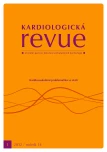Subclinical brain damage in older patients with hypertension and dementia
Authors:
M. Souček
Authors‘ workplace:
II. interní klinika FN u sv. Anny v Brně
Published in:
Kardiol Rev Int Med 2012, 14(1): 14-16
Overview
Subclinical brain damage in older patients with hypertension and dementia. Major attention has recently been given to subclinical organ damage due to the influence of high blood pressure. The option to utilise nuclear magnetic resonance in diagnostics has given more scope for the discovery of early-stage organ damage, including that caused to the brain. It seems that it is precisely the close relationship between hypertension and the brain that is the cause of frequent asymptomatic impairment. Therapy through the treatment of hypertension is possible and is closely related to disorders of the cognitive functions and dementia.
Keywords:
hypertension – subclinical organ damage – antihypertensives – dementia
Sources
1. Mancia G, Laurent S, Agabiti-Rosei E et al. European Society of Hypertension. Reappraisal of European guidelines on hypertension management: a European Society of Hypertension Task Force document. J Hypertens 2009; 27 : 2121–2158.
2. Longstreth WT Jr, Manolio TA, Arnold A et al. Clinical correlates of white matter findings on cranial magnetic resonance imaging od 3301 elderly people: The Cardiovascular Health Study. Stroke 1996; 27 : 1274–1282.
3. Vermeer SE, Longstreth WT Jr, Koudstaal PJ. Silent brain infarcts: a systematic review. Lancet Neurol 2007; 6 : 611–619.
4. Vermeer SE, Prins ND, den Heijer T et al. Silent brain infarcts and the risk of dementia and cognitive decline. N Engl J Med 2003; 348 : 1215–1222.
5. Godin O, Dufouil C, Maillard P et al. White matter lesion as a predictor of depression in the elderly: The 3C-Dijon study. Biol Psychiatry 2008; 63 : 663–669.
6. Snowdon DA, Greiner LH, Mortimer LA et al. Brain infarction and the clinical expression of Alzheimer disease: The Nun Study. JAMA 1997; 277 : 813–817.
7. Buyck JF, Dufouil C, Ducimetiere P et al. Cerebral white matter lesions are associated with the risk of stroke but not with other vascular events. The 3c-Dijon Study. Stroke 2009; 40 : 2327–2331.
8. Silvestrini M, Gobbi B, Pasqualetti P et al. Carotid atherosclerosis and cognitive decline in patients with Alzheimer‘s disease. Neurobiol Aging 2009; 30 : 1177–1183.
9. Hanon O, Haulon S. Lenoir H et al. Relationship between arterial stiffness and cognitive function in elderly subjects with complaints of memory loss. Stroke 2005; 36 : 2193–2197.
10. Kearney-Schwartz A, Rossignol P, Bracard S et al. Vascular structure and function is correlated to cognitive performance and white matter hyperintensities in older hypertensive patients with subjective memory complaints. Stroke 2009; 40 : 1229–1236.
11. Henskens LH, van Oostenbrugge RJ, Kroon AA et al. Detection of silent cerebrovascular disease refines risk stratification of hypertensive patients. J Hypertens 2009; 27 : 846–853.
12. Dufouil C, Godin O, Chalmers J et al. PROGRESS MRI Substudy Investigators. Severe cerebral white matter hyperintensities predict severe cognitive decline in patients with cerebrovascular disease history. Stroke 2009; 40 : 2219–2221.
Labels
Paediatric cardiology Internal medicine Cardiac surgery CardiologyArticle was published in
Cardiology Review

2012 Issue 1
-
All articles in this issue
- Subclinical brain damage in older patients with hypertension and dementia
- Deep venous thrombosis and pulmonary embolism in geriatric medicine – two sides of the same coin
- New approaches to anticoagulant treatment for senior citizens with atrial fibrillation
- Complications of cardiac pacing in group of patients with higher age
- Complications of infrainguinal revascularization procedures in elderly patients
- Dyslipidemia in 2012
- Atherosclerosis of the intracranial arteries – current view, 2nd part
- An anusual diagnostics of implantable cardioverter-defibrillator lead perforation
- Cardiology Review
- Journal archive
- Current issue
- About the journal
Most read in this issue
- Complications of cardiac pacing in group of patients with higher age
- Deep venous thrombosis and pulmonary embolism in geriatric medicine – two sides of the same coin
- New approaches to anticoagulant treatment for senior citizens with atrial fibrillation
- Complications of infrainguinal revascularization procedures in elderly patients
